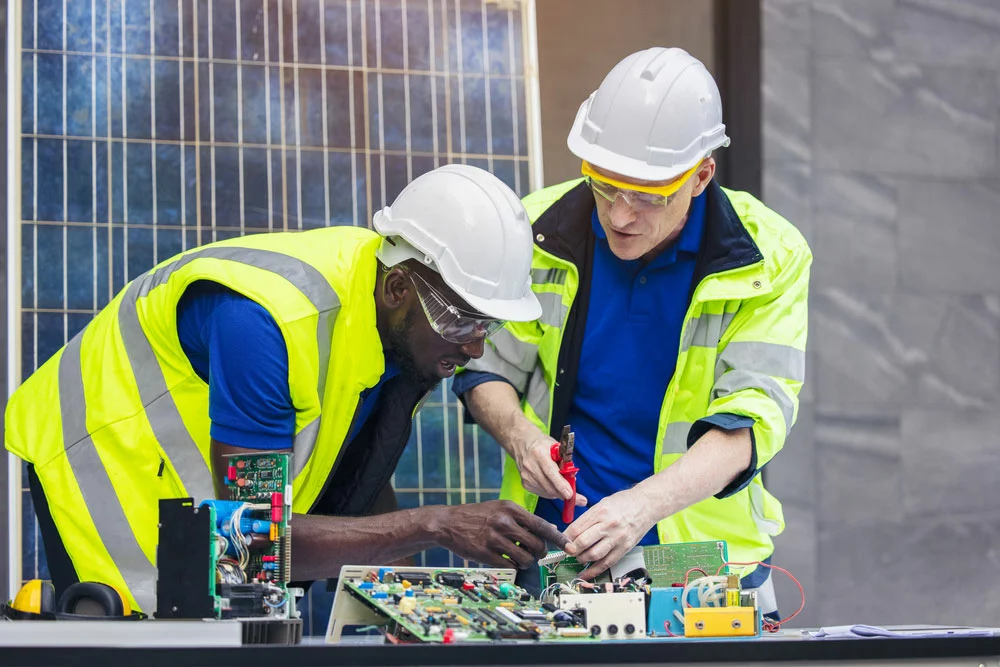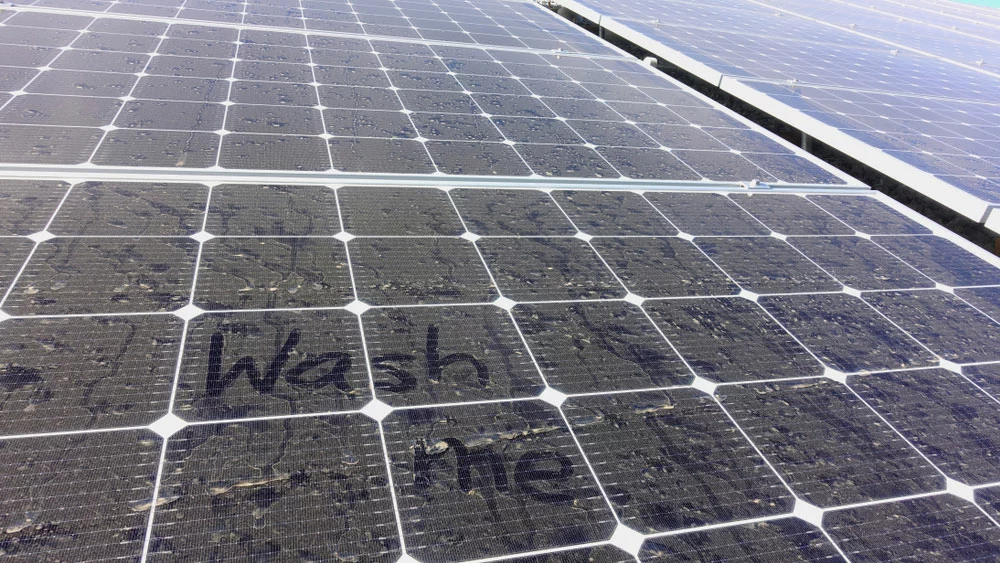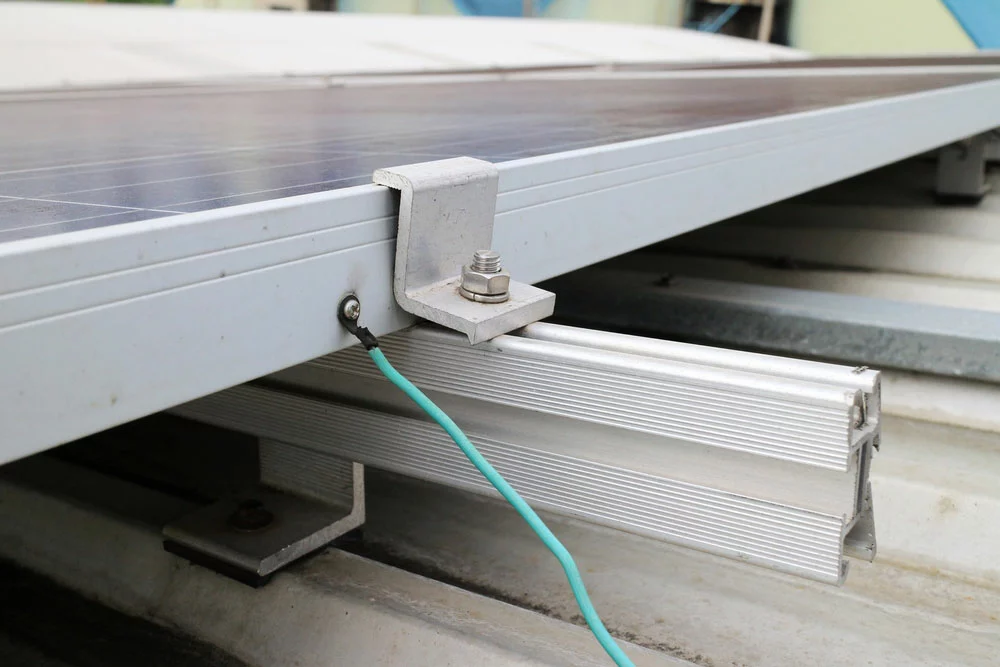If you’re considering installing solar panels, you’re also basing your decision on a few factors, including price, aesthetics, and inverters. However, one final factor to consider is how long the solar panel warranty is. After all, the expected lifetime of solar panels is limited, and we need to ensure that our purchase will last through years of use. Solar panel warranties could be clearer, and it’s difficult to understand the technical jargon. In this article, we’ll explain solar panel warranties in easy-to-understand language.
What is a solar panel warranty?
A solar panel warranty is a guarantee from the manufacturer that its panels will perform as expected for a certain amount of time. If you have problems with your panels during this period, then you may be able to get them repaired or replaced free of charge by the manufacturer.

Technicians repairing a solar power system
Solar panel warranties are an essential part of owning a solar energy system. Manufacturers typically include them in the purchase price of your solar panels, and they can provide peace of mind if something goes wrong with them. The length of time covered by a warranty will vary depending on which company you purchase your system. They typically range between 10 and 25 years long.
Types of Solar Panel Warranties
Solar panel warranties come in two forms; performance warranties, which cover the efficiency of your system, and product warranties, which cover any defects in materials or quality.
Performance warranty
A solar performance warranty guarantees that the solar panels will provide a certain amount of energy over a while. Often, this warranty will ensure that your solar panels generate at least 80% of the electricity stipulated in terms of watts throughout their lifespan. The warranty length depends on several factors, but it can range from 10 to 25 years.
The power generated by your panels generally decreases as time goes by. A phenomenon known as Light Induced Degradation (LID) causes this. This results in a 3% energy output drop in the first year, with succeeding years seeing a maximum of 0.7% loss. Depending on the solar manufacturer, your panels may remain at a 92% power output rate after the 25th year.
There are two types of performance warranties; linear and step.
- Manufacturers use linear warranties for solar panels that will experience a gradual drop-off in performance as the year’s roll. This means the guaranteed solar power output will decrease progressively until the 25th year. If the power generated is below this, you’re liable to get a refund.
- Step warranties indicate that the solar performance will experience a prescribed decline after a set number of years. For example, the solar panels’ warranty may state that the power output will be at 93% in the tenth year and 85% after the 25th year. You’re liable for a refund if output goes below these percentages in the set year.
Product Warranty
A solar product warranty guarantees that a solar panel will perform as expected for a certain period. If your system doesn’t work as promised during this period, you can be eligible to receive compensation.
Depending on the terms of your contract, the manufacturer is liable to replace or repair the solar if any defects occur within the stipulated time. A product warranty will protect the buyer against poor quality and faulty solar panels. Defective parts may include the frame, which the manufacturer may not have adequately anodized, quality issues, component failures, etc.

Dusty solar panels
Factors that can void your warranty
There are a few factors that can void your solar panel warranty, including;
Misuse of the solar panel
Using the solar panel in a way that is different from its intended use. Or using non-approved mounting hardware or metal instead of plastic fasteners. This could damage the panel, and you’ll have to replace them out of pocket.
Ignoring Instructions Manual
Suppose you install the panel without following the manufacturer’s instructions. This includes using panels from multiple manufacturers simultaneously or using the wrong inverters for your panels.
Using an uncertified solar technician could void your warranty. This also applies to minor repairs you may undertake on the solar system. Contact the solar manufacturer for references if you do not have a certified technician in your phonebook.

A solar panel with improper grounding
Poor Maintenance
If you don’t maintain your solar panels according to the manufacturer’s instructions. This means keeping them clean and free of debris, dirt, and grime. It’s also essential to keep them clear of snow during winter and avoid any physical damage.
Failure to Report Solar Panel Malfunction
Another factor that could void your solar panel warranty is neglecting to report any problems with your solar panels as soon as they occur. If something goes wrong with your solar panels, it’s essential to report it immediately so that it doesn’t become worse and cause more damage than necessary.
Damage from environmental factors
Environmental factors such as wind or lightning strikes may damage sections of your solar panel, lowering their performance. Warranties do not cover this.
Hotspots
Hot spots are places on the surface of a solar panel that get hotter than the rest of the panel. These areas result from something blocking or covering part of the panel, which prevents it from receiving light. The result is that the uncovered parts of the panel heat up more quickly, causing them to overheat and break down. Permanent solar panel damage by hot spots can void your warranty.
Summary
You should definitely look into solar panel warranties before purchasing a solar system for your home. You’re essentially investing in your home and potentially committing to a long-term agreement to pay for energy from that system. Understanding what’s covered and how a warranty can work in your favor will make you better prepared to make the right choice. If you’re in the market for a new solar energy system, using these tips should be a good start toward understanding your equipment’s warranty and whether it is a good deal.
